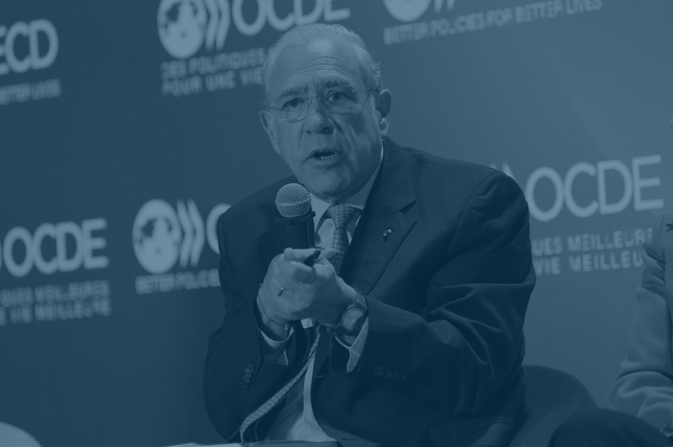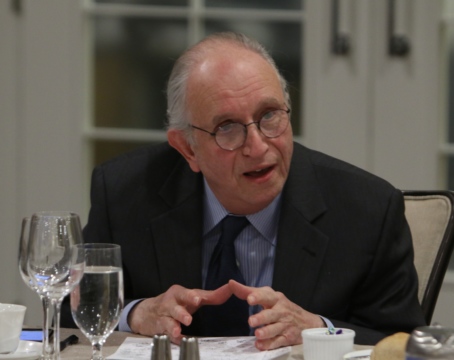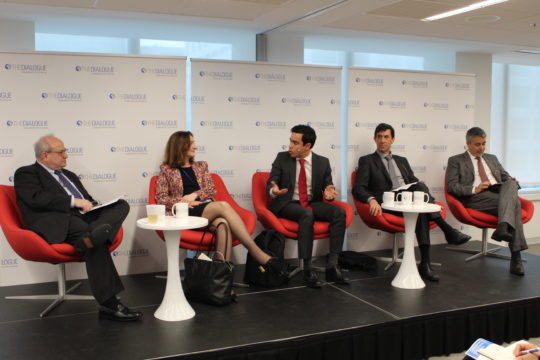Mexico: How Far Have its Institutions Really Come?
The question remains if Mexico has achieved a degree of institutional development consistent with its participation in those organizations.
On May 22, 2020, the Inter-American Dialogue hosted “Assessing the Economic and Social Impact of Covid-19 – A Conversation with OECD Secretary-General, Ángel Gurría.” Before being appointed Secretary-General in 2006, Gurría served as Minister of Foreign Affairs and Minister of Finance and Public Credit for his home country of Mexico. He has been a member of the Dialogue since 2001. Michael Shifter, president of the Dialogue, moderated this conversation.
In his introductory remarks, Shifter posed an overarching question to Gurría to guide the conversation: “What are likely effects [of Covid-19] on globalization, trade, integration, financial markets, health care systems, social protection systems, the climate, and the lives and livelihoods of all citizens?”
In his response, Gurría asserted, “There’s a false dilemma [between lives and livelihoods.] You fight with everything you’ve got against the virus in order to then reduce the economic cost.” Due to the stagnation that the global economy was already facing before the virus, he stressed that mitigation of the economic cost is especially crucial now. Before the outbreak, many countries and corporations were very much in debt due to low-interest rates. Trillions each year were being issued in nonfinancial corporate debt, and only one systemic shock was needed for that debt to be downgraded below the investment rate. Moreover, widespread trade tensions in the pre-pandemic era had led to uncertainty, which in turn led to a lack of investment and the global slowdown.
While Gurría acknowledged the detrimental economic effects of Covid-19 on OECD countries, he recognized that the pandemic is affecting developing countries and emerging economies in an even more tragic way. In comparison to the OECD average, health systems in developing countries are not as strong or resilient. Furthermore, these countries do not have large sums of money to channel towards the alleviation of the crisis. In the vast majority of Latin American countries, this is a result of poor tax compliance leading to low government revenue vis-à-vis high citizen needs. Regarding the way forward for Latin America, Gurría emphasized that multilateralism is the obvious approach. He underscored the need for further regional integration and key policy updates to increase governmental revenue streams and stop tax evasion.
After Gurría concluded his opening response, he addressed questions from the audience. In the last month, both Colombia and Costa Rica have joined Mexico and Chile to become the third and fourth Latin American countries to accede to the OECD. Currently, Argentina, Brazil, and Peru are engaged in campaigns to become members of the OECD, and Gurría was asked to share his perspective regarding the Brazilian case in particular. He gave Brazil kudos for not waiting for the OECD’s accession decision to start joining more committees, working groups, and instruments of the OECD. Ultimately, Gurría asserted, “I hope we can move it [Brazil’s accession] from the formal point of view, but from the practical point of view, it’s already happening.”
The final question from the audience requested Gurría’s guidance on how to work towards a more inclusive recovery in Latin America. He advised, “You don’t necessarily need to have ‘finished’ the pandemic before you can start rebuilding…building back better.” In order to do so, Gurría recommended that governments first tackle deficits in both health and education, especially as it pertains to the rural-urban divide. Finally, in order to address the crisis of confidence that many Latin American governments face, Gurría advised that they work towards a restoration of the social contract between themselves and their citizens through a commitment to fair taxation practices and transparent government spending.
Remarks by Angel Gurría, OECD Secretary-General. Paris, OECD - 22 May 2020 (As prepared for delivery)
OECD calls for billions in funding to fight Covid-19 in LatAm (May 26, 2020 – Latin Finance)
Tras crisis del coronavirus, América Latina necesita más integración: OCDE (May 22, 2020 – Milenio)
The question remains if Mexico has achieved a degree of institutional development consistent with its participation in those organizations.
Peter Hakim, president emeritus of the Inter-American Dialogue, spoke to Brazilian newspaper O Estadão. In this interview he analyzes the idea of Brazil’s admission to the OECD and the relationship between Trump and Bolsonaro.
On April 12, the Inter-American Dialogue hosted an event titled “Latin America’s Digital Economy and Trends in International Taxation.” The discussion took place in the context of a recent OECD report, that reported that a global consensus on how to tax businesses with a substantial digital footprint but no physical presence in a given country remains elusive.
 Hervé Cortinat, OECD / Flickr / CC BY-NC 2.0
Hervé Cortinat, OECD / Flickr / CC BY-NC 2.0

 Video
Video